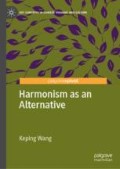Abstract
The notion of harmony is taken as a fundamental guideline to govern a country properly. Yet, it is not working alone because it requires such auxiliaries as rites equivalent to legal codes, authorized regulations, institutional systems, mores of conduct and so forth. It is in Confucianism that the idea of harmony had been recognized as the highest form of achievement in Chinese political arena. In principle, it is intended to ensure and actualize order and peace by which further social development is considered to be probable, beneficial and constructive, and in which every member from the old to the young, and from the able to the disabled, will live a reasonably good and just life.
Access this chapter
Tax calculation will be finalised at checkout
Purchases are for personal use only
Notes
- 1.
According to the Chinese original statement, its English translation is modified with a particular reference to that of the same passage in these two versions: (1) ‘Of the things brought about by the rites, harmony is the most valuable. Of the ways of the Former Kings, this is the most beautiful, and is followed alike in matters great and small, yet this will not always work: to aim always at harmony without regulating it by the rites simply because one knows only about harmony will not, in fact, work.’ See Confucius, The Analects (trans. D. C. Lau, London: Penguin Books, 1979), 1:12. (2) ‘In practicing the rules of propriety, appropriateness is to be prized. In the ways prescribed by the ancient kings, this is the excellent quality, and in things small and great we follow them. Yet it is not to be observed in all cases. If one, knowing how such appropriateness should be prized, manifests it, without regulating it by the rules of propriety, this likewise is not to be done.’ See Confucius, The Confucian Analects, in The Four Books (trans. James Legge, Changsha: Hunan Press, 1995), 1:12.
- 2.
Plato, The Republic (trans. Desmond Lee), 558b–558c, 562c–563e.
- 3.
Plato, The Laws (trans. Trevor J. Saunders, London: Penguin Books, 1975), 700a–701b.
- 4.
Wang Keping, “The Theatrocracy and Corrupted Democracy”, in Wang Keping, Rediscovery of Sino-Hellenic Ideas (Beijing: Foreign Languages Press, 2016), p. 276.
Author information
Authors and Affiliations
Corresponding author
Rights and permissions
Copyright information
© 2019 Foreign Language Teaching and Research Publishing Co., Ltd.
About this chapter
Cite this chapter
Wang, K. (2019). The Paradigmatic Mode. In: Harmonism as an Alternative. Key Concepts in Chinese Thought and Culture. Palgrave Pivot, Singapore. https://doi.org/10.1007/978-981-13-3564-8_6
Download citation
DOI: https://doi.org/10.1007/978-981-13-3564-8_6
Published:
Publisher Name: Palgrave Pivot, Singapore
Print ISBN: 978-981-13-3563-1
Online ISBN: 978-981-13-3564-8
eBook Packages: Religion and PhilosophyPhilosophy and Religion (R0)

